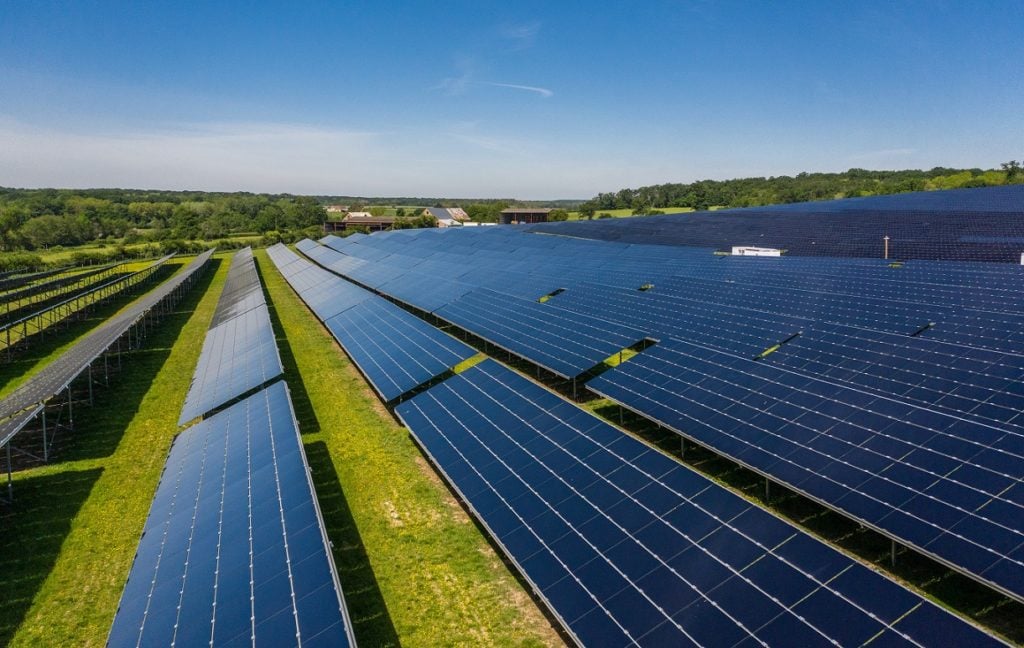
Global investment in renewables rose to new heights in 2021 as solar and wind deployment surged, but total energy transition expenditure needs to triple in the coming years to get on track for net zero.
That is according to research firm BloombergNEF’s (BNEF) latest Energy Transition Investment Trends report, which found that global investment in the energy transition jumped 27% year-on-year in 2021 to a record US$755 billion thanks to rising climate ambition and policy action from countries around the world.
Try Premium for just $1
- Full premium access for the first month at only $1
- Converts to an annual rate after 30 days unless cancelled
- Cancel anytime during the trial period
Premium Benefits
- Expert industry analysis and interviews
- Digital access to PV Tech Power journal
- Exclusive event discounts
Or get the full Premium subscription right away
Or continue reading this article for free
Renewable energy was the largest sector in investment terms, attracting US$366 billion for new projects and small-scale systems, a 6.5% rise on 2020.
Investment rose in almost every sector covered, including renewables, energy storage, electrified transport, electrified heat, nuclear, hydrogen and sustainable materials. Only carbon capture and storage posted a decline.
BNEF head of analysis Albert Cheung said that against a backdrop of the global commodities crunch that has raised input costs for technologies like solar modules, a 27% increase in energy transition investment “is an encouraging sign that investors, governments and businesses are more committed than ever to the low-carbon transition, and see it as part of the solution for the current turmoil in energy markets”.
Investment levels now need to roughly triple, so that they average US$2.1 trillion per annum between 2022 and 2025, to get on track for three scenarios for reaching net zero by 2050 that were included in BNEF’s New Energy Outlook (NEO) report, published last year.
For those routes, most of the spend in 2022-25 would be needed in renewable energy and electrified transport, with the former requiring an average of US$667 billion per annum, more than 80% higher than last year’s figure.
Energy transition investments would then need to double again, to an average of US$4.2 trillion between 2026 and 2030. At current growth rates, BNEF said the electrified transport sector has the best chance of reaching such investment levels, but other sectors “look less likely to get on track”.
“The energy transition is well underway, and moving faster than ever, but governments will need to mobilise much more finance in the next few years if we are to get on track for net zero by 2050,” said Matthias Kimmel, head of energy economics at BNEF.
The ‘green’ scenario in BNEF’s NEO report would require annual global solar deployment to treble in the coming decade, with 455GW of new solar added each year, on average, to 2030, when 5.3TW would be deployed. The ‘green’ route “is the most likely” of the three, Jenny Chase, head of solar analysis at BNEF, told PV Tech last year, with it relying heavily on PV, wind and hydrogen to decarbonise industry.
Investment jumps 60% in China
The Energy Transition Investment Trends report revealed that record amounts were invested last year in all three regions covered: Asia Pacific; Europe, Middle East and Africa (EMEA); and the Americas.
Asia Pacific was both the largest region for energy transition investment, with nearly half of the global total, at US$368 billion, and the region with the highest growth at 38% in 2021. Cementing its position as the leading country, China’s energy transition investment hit US$266 billion, rising 60% year-on-year.
The US was in second place with US$114 billion, up 17%, followed by Germany (US$47 billion), the UK (US$31 billion) and France (US$27 billion).
In addition to the energy transition investment, the research found that climate-tech corporate finance was US$165 billion in 2021. This category describes new equity financing raised by companies in the climate-tech space, either from public markets or private investors.
Securing US$68.5 billion, the energy sector raised the largest amount of capital, with the most popular segments being solar, wind and hydrogen.
According to research published earlier this month by consultancy Mercom Capital Group, corporate funding in the global solar sector reached a ten-year high in 2021 as mergers and acquisitions activity broke new records.






